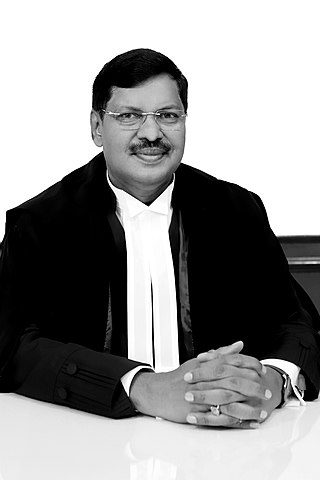Top Qs
Timeline
Chat
Perspective
B. R. Gavai
52nd Chief Justice of India From Wikipedia, the free encyclopedia
Remove ads
Bhushan Ramkrishna Gavai (born 24 November 1960), better known as B. R. Gavai, is an Indian jurist who is currently serving as the 52nd Chief Justice of India since 14 May 2025.[2] He is a former judge of the Bombay High Court and also currently serves as the chancellor of some National Law Universities (NLUs).[3][4][5] He is also the ex officio patron-in-chief of National Legal Services Authority.[6]
This article contains one or more duplicated citations. The reason given is: DuplicateReferences detected:
(June 2025)
|
Remove ads
Early life and education
Gavai was born on 24 November 1960 in Amravati, Maharashtra, and studied at a primary municipal school in Amravati. He then studied at Chikitsak Samuha Shirolkar Madhyamik Shala and at Holy Name High School in Mumbai.[7] After earning degrees in commerce and in law from Amravati University, he joined the legal profession in 1985.[8]
Career
Summarize
Perspective

Gavai worked with Bar under Raja S. Bhonsale, former advocate general and judge of the High Court. He practiced independently at Bombay High Court from 1987 to 1990. After 1990, he practiced mainly before the Nagpur Bench of the Bombay High Court. He also practiced constitutional law and administrative law.[2]
Gavai was standing counsel for the municipal corporation of Nagpur, Amravati Municipal Corporation, and Amravati University. He regularly represented as counsel various autonomous bodies and corporations like SICOM, DCVL, etc., and various municipal councils in the Vidarbha region. He was appointed as assistant government pleader and additional public prosecutor in the High Court of Judicature at Bombay, Nagpur Bench, from August 1992 to July 1993. Later, he was appointed as government pleader and public prosecutor for the Nagpur Bench on 17 January 2000. He was elevated as an additional judge of the High Court on 14 November 2003. On 12 November 2005, he became a permanent judge of the Bombay High Court. After serving as a High Court judge for 14 years, he was appointed as a judge of the Supreme Court of India on 24 May 2019, a position he held until 13 May 2025.[9]
On 14 May 2025, Justice Bhushan Ramakrishna Gavai was sworn in as the 52nd Chief Justice of India by President Droupadi Murmu. His term will be till 23 November 2025 i.e. for six months. He is the first Chief Justice of India from the Buddhist community. He is also the second Dalit (SC) to hold the office, following Justice K. G. Balakrishnan, a member of the Scheduled Castes, who previously served as Chief Justice.[10][11][12][13] As of January 2025, the Supreme Court of India had three sitting judges from the Scheduled Castes – Justice B. R. Gavai, Justice C. T. Ravikumar (since retired), and Justice Prasanna Varale. This marks the highest representation of the Scheduled Caste community in the history of the Supreme Court.[10][11][12][13] Notably, both Justice B. R. Gavai and Justice Prasanna B. Varale belong to the Buddhist faith, making it the first time in the Court's history that two Buddhist judges are serving simultaneously.[10][11][12][13] He is due to retire on 23 November 2025.[2]
Remove ads
Notable judgements
Summarize
Perspective
Justice B.R. Gavai has authored and contributed to several landmark decisions of the Supreme Court of India. His judgments span a wide range of constitutional, criminal, and administrative matters.
Article 370 abrogation
Justice Gavai was a member of the five-judge Constitution Bench that upheld the abrogation of Article 370, which granted special status to the erstwhile state of Jammu and Kashmir. The Court ruled unanimously that the Presidential orders and the subsequent changes by Parliament were constitutionally valid. The Bench also directed that statehood be restored and that elections be conducted by September 2024.[14]
Electoral bonds scheme struck down
In ''Association for Democratic Reforms v. Union of India'', Justice Gavai was part of the Constitution Bench that unanimously struck down the Electoral Bonds Scheme, holding it to be violative of citizens' right to information under Article 19(1)(a) of the Constitution.[15]
Bulldozer demolitions without due process
Justice Gavai co-authored a decision that condemned demolition of homes of accused persons by state authorities without following due process. The Court held that such actions violated the principles of the rule of law and separation of powers.[16]
Sub-classification among scheduled castes
Justice Gavai was part of the seven-judge Constitution Bench in State of Punjab v. Davinder Singh, which held that sub-classification among Scheduled Castes for more equitable affirmative action is permissible. He emphasized the need to identify and exclude the creamy layer within SC/ST categories to ensure substantive equality.[17]
Stay on conviction of Rahul Gandhi
In 2023, Justice Gavai was part of the Bench that stayed the conviction of Rahul Gandhi in a criminal defamation case. The Court noted that the conviction had far-reaching consequences, including disqualification from Parliament.[18]
Personal life
Bhushan Ramakrishan Gavai was born to R.S. Gavai and Kamala on 24 November 1960. His father led the Republican Party of India (Gavai) faction and had been an M.P. and Governor. His brother Rajendra Gavai is also a politician. His family is inspired by B. R. Ambedkar and follows Buddhism.[19][20][21][22]
References
External links
Wikiwand - on
Seamless Wikipedia browsing. On steroids.
Remove ads

